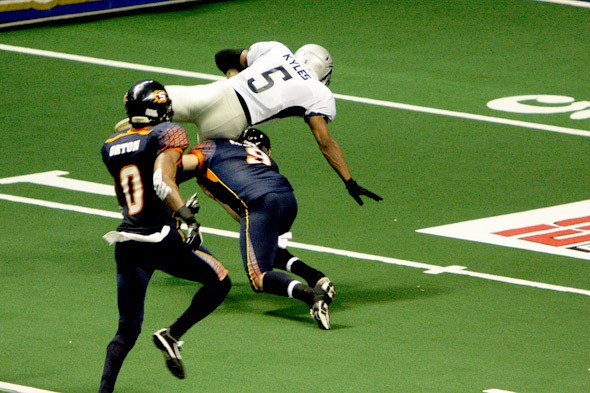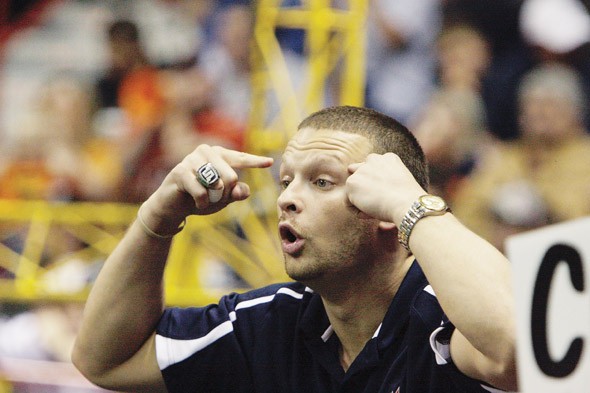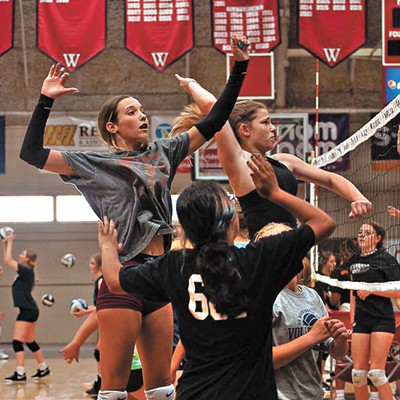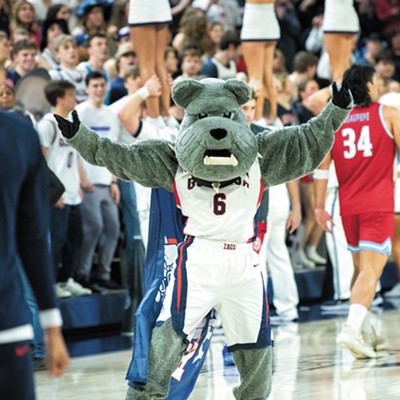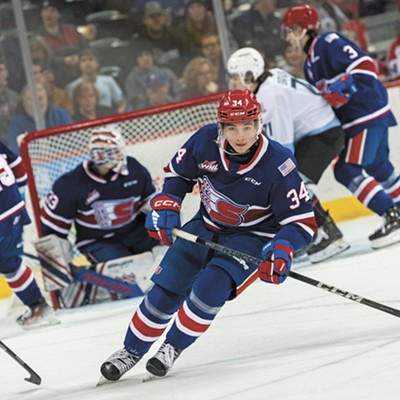Erik Meyer is not moving. He lies face-down, mask dug into the turf, completely still. The stomp and roar of the crowd at the Spokane Arena usually shakes the concrete supports beneath the stands like a seismic event. Now, though, you can hear individual voices in the pitched bowl of the Arena — 9,499 fans, concessioners, support staff, teammates, Shox the Fox — everyone seeming to wonder: Is he all right?
He is not all right.
Before this moment, though, the Shock quarterback (their sixth QB this season) had been perfect. Well, as perfect as one can be on a 66-yard field in a padded hockey rink with 17 other guys, eight of whom want to help you and the other nine of whom want to annihilate you.
In his first game since being traded from Utah, he had made spectacular plays against the Philadelphia Soul. If this had been the NFL, the dart he threw to Markee White (who caught it one-handed in the end zone) would have made SportsCenter.
But this is not the NFL. Meyer has had three separate shots at the NFL but never made it out of training camp. All he wants is his fourth shot.
To get that shot, Meyer will need to lead the struggling Shock to the playoffs. First, though, he will need to get off the turf.
The Shock are trying to claw their way into contention after the worst start in team history. The only bad start in team history, in fact — 0-3, then 1-4, and, when Meyer came, 4-7.
The team is still in contention, not because they’ve played well, but because enough teams have played equally poorly. To ensure they make the playoffs, the Shock can’t lose even one more game.
As a quarterback in arena football, Meyer is expected to score and score and score and hope that, at some point in the game, the other team slips.
Before the blow tonight — at home against Chicago, the best defense in the league — Meyer had scored on every possession (throwing five passes, setting up a goal-line run) until the other guy, Chicago quarterback Russ Michna, blinked. Michna got sacked, fumbling in his own end zone, resulting in a Shock touchdown.
But then, in the third quarter, Meyer blinked, too. The Shock were up 49-27 and cruising. Meyer wanted to take the game completely away. He threw a long shot that needed to be perfect and wasn’t. Chicago’s Perry Kyles intercepted.
Kyles ran until there was only Meyer between him and the end zone. Meyer went low to bring him down, but when Kyles got up, Meyer didn’t.
After Meyer is carted off, Shock coach Rob Keefe puts in rookie Stephen Sheffield (the seventh quarterback they’ve used this season). He throws two touchdowns and an interception, eking out a three-point victory. With last week’s win against Philadelphia, that makes two in a row. To make the playoffs, they’ll need five more just like it.
A week later, after the ringing from his concussion stops, Meyer will admit, “I got a little greedy.” The coverage had been tight. He shouldn’t have thrown. Keefe agrees on a number of levels. “You don’t throw that interception, you don’t get hurt,” he says.
But he did get hurt. And in the week that Meyer was out, two quarterbacks — Kyle Rowley and Bill Stull — came back from injuries, combining to destroy New Orleans.
By the time Meyer’s head stopped ringing, Keefe had declared the starting QB position to be up for grabs.
If Meyer wanted to be the guy, he was going to have to fight for it.
Brady Nelson is not moving. He tried that once. To Milwaukee.
The Shock owner was young and needed to find work. Nelson and his wife, Danna, were starting a family. Brady had sold pest control door-to-door in college and liked the freedom of that, but Danna felt they needed more stability. Brady says she wanted him to get a “quote unquote real job.” Something with a steady paycheck.
He found the real job in Milwaukee, as an analyst for Kohl’s department stores.
On a trip to look for homes, though, it rained. It was cold. Danna hated it. “She cried for about three days while we were out there,” he says. He didn’t like seeing her sad, Brady says, but he was excited.
He said to Danna, “Let me just try my own business and if it works, then we won’t go here. We’ll just do whatever we want to do.”
His whole life, Nelson has wanted to do whatever he wanted to do. He grew up in Spokane Valley and says that, as early as he can remember, “I didn’t want to take any money from my parents, didn’t want money from anyone.”
After Milwaukee, he started to think of things he could sell door-to-door besides pest control. He came up with satellite dishes. “Satellite TV because satellite TV’s cheaper than cable TV,” he says, “so that seemed like an easy deal.”
He recruited a bunch of college students — some of his brother’s friends — and started out. By spring of 2005, Nelson was doing very well. His brother was too, after recovering from a bout with cancer that left him unable to go outside. To celebrate, Nelson says, the two wanted to go catch a game.
There was nothing to catch. No baseball, no football, nothing in college. He heard about this thing called arena football, but that wasn’t happening either. There weren’t any teams around. Which got Nelson thinking. He thought, “I know I’m young, I know that I don’t have any credibility, you know, regionally or anything like that — but if I don’t jump on this, somebody else is gonna get this idea before I will. I gotta move.”
Five years later, Brady Nelson is still a salesman. He sells football perfection (he also still has the satellite company). He sells Winning It All, even though his coaches tend to move on (each of the Shock’s three championships has been with a different one) and his players move on (only one player, receiver Raul Vijil, has been with the team since it began). Nelson and the team he has assembled have been very good at it.
Nelson wears the trappings of his wealth modestly, but they’re there. At his desk the day we talk, he wears a perfectly pressed Ralph Lauren Polo shirt and fiddles with a Mercedes SmartKey. Making money is important to him, he says. So is winning. They’re inseparable, in a sense, but if he had to choose between the two, he says, “Winning is the most important.”
He wants the Shock to win so often and so reliably that people begin to use the word “dynasty” when they talk about the team. Before this year, that seemed reasonable. They won two arenafootball2 championships in their first four years. When they moved up to the larger Arena Football League, they won the championship their first year out.
Nelson has made the Shock a marketing juggernaut. They have 25,000 fans on Facebook, 10,000 more than the closest team. They sold more season tickets before opening day in 2006 than any other team in the af2. Besides letting Republican senatorial candidate Dino Rossi do the coin toss at last year’s ArenaBowl, which sparked controversy among local Democrats, the Shock’s PR has been nearly perfect.
This year has been hard, though. The Shock lost more games in the first three weeks than they did all last season. Ticket sales hit an all-time low.
“[The atmosphere in the office] was more tense than it ever has been,” Nelson says, “It’s like a fighter who’s never really been punched in the face.”
Until now, it has been all about championships. This year, Nelson says, “I’d say I’ll be happy if we make the playoffs.”
The Shock burned through seven quarterbacks this year. Suddenly, they have three fighting to start. They’ve lost one key offensive playmaker to a different league and, before June is over, they’ll lose their top receiver and a standout offensive lineman as well. “Players can move up at any time,” the Shock’s director of player personnel, Ryan Rigmaiden, says. You counter that by talking to a lot of potential players. He says he’s talking to 57 wide receivers alone right now.
There is no way to stop the flux of arena football so you have to make it part of your plan. Nelson believes that the Shock are already the best in the league at this — “identifying who we can bring. Estimating when people are leaving.”
Nelson says the thing they’re learning right now is something you can only learn through adversity, but he’s not content to keep taking shots to the face. When the next punch comes, no matter where it comes from, he wants his organization to have the finesse to move.
Markee White is not moving. The star receiver sits at a folding card table beside the register counter at Divine’s FasMart on East Mission, texting. Next to him, in little blue boxes, are Markee White bobbleheads. Fans will come in soon and buy them, and then White will sign them.
White’s body is long, verging on skinny. His bobblehead is skinny, too, which doesn’t leave much surface area for autographs. He explains this difficulty to people and they say, “Sign it wherever,” smiling.
Most arena football players make $400 a game, but each team is allowed three “marketing players.” White is one of these. He makes $1,000 a game in exchange for doing things like autographing bobbleheads.
Communications Director Kevin Maloney says the Shock hold signings like this because they want fans to connect with players. The problem, though, is that things change faster in arena football than they do in other sports.
White won’t even be here the whole season. And while he’s been here, he’s been out 2 1/2 months with a foot injury.
There are two bobbleheads in this latest series. The other is of Quarterback Kyle Rowley. He’s been hurt too.
It’s hard to plan this stuff, Maloney says. “We ordered these in December.”
White is good in this league. He is much taller than the average AFL receiver. At 6-foot-7, he has NFL height. He has NFL skills, too, he says, though not in a way that comes across as cocky. He played two sports at Texas State. The other was basketball, so he has an NBA leap to go with the NFL height.
The conventional wisdom is that guys who take their chances get good game footage to send to NFL teams. Kurt Warner played arena football, got his shot in the NFL, won a Super Bowl, and now he’s going to be a Hall of Famer. Warner is the best sales pitch the AFL has.
White doesn’t like the idea of only playing in one league, though. NFL height does no good if you’re not on the NFL’s radar, so White keeps moving. Last year, after a breakout season with the Shock that ended in a colossal performance in the ArenaBowl — he caught nine passes, eight for touchdowns — he flew across country to play in the UFL, a 100-yard, outdoor game a lot like the NFL.
When I ask White about what a long shot this dream is, he cites the success of Warner. He also points to Rod Windsor, a former AFL receiver who also played UFL last year and signed a practice-squad deal with the Cleveland Browns. (Since the NFL lockout, he has returned to the AFL.)
That is the way this league works. Before June is out, the Shock will have lost Greg Orton — their top receiver — and Ben Ossai, a rock of an offensive lineman, to the UFL.
White will be gone, too, back in Hartford, Conn., two weeks after coming off of his injury.
In the UFL, Orton will make over five times what he makes playing arena ball — $40,000 in eight games versus $7,200 in 18. More importantly for getting noticed, White will be playing under former Atlanta Falcons head coach Jerry Glanville. Ossai will play in Las Vegas under former New York Giants head coach Jim Fassel.
“I want young, hungry players that want to move on, that want to use Spokane as a stepping stone,” says Rigmaiden,whose job is to move them up and have someone ready to fill in behind.
At Divine’s FasMart, I ask White how much longer he’ll spend trying to get noticed. He squints and says he’ll do this as long as he has to. He was hurt, but his foot feels good now. He says he could keep this up for years.
“How old was [NFL legend] Jerry Rice when he retired?” he asks. “Like 42?”
White will do what he needs to do while he’s here, he tells me, but the moment he gets his shot, he’s gone.
Rob Keefe is not moving. He usually never stops, but right now he has. The coach is lying on the turf next to Meyer, after the shot that took him out of the Chicago game.
Keefe is concerned for Meyer. But there is concern and there is distraction.
Distraction is always bad, Keefe says. When you are a coach, and your team isn’t winning, distraction is unforgivable.
When you are a coach and your team is losing, your only job is to find a way to win. You do this by being up at 6 am, being the first one into work and the last one out. You lead the morning practice — which sometimes stretches into the afternoon — and then you work to dinnertime. You eat, and then you watch game tape and then, at 10 pm, you fall asleep. You “work 15 hours on a random Wednesday.”
Even when you have a championship under your belt, like Keefe does, when you’re 1-4, “it was, you know, ‘Who is this Keefe guy? Is he all he’s cracked up to be?’”
But you don’t lose confidence. You worry about football and you stop worrying about everything else besides football. “And, yeah,” Keefe says, after enough losses, “you start feeling like you have a target on your back.”
You make hard decisions, like trading a solid center and a good defensive end to a division rival — a team you absolutely cannot lose to again — for Erik Meyer, who has become your best shot at getting even a single win while your championship quarterback and his talented backup are out with injuries.
You know your team is better than this. You tell reporters you understand you’re David right now, going after Goliath, but what you really want is to be Goliath. You say, “I wanna be Goliath. I wanna be the person that crushes David. That’s where we wanna get to — little David doesn’t have a chance — but right now we’re the little guys.”
All this work isn’t because you love winning, Keefe says. “I hate losing more than I love winning.”
Winning is what Keefe expects. “I don’t not see myself holding up the trophy this year, man.”
Last week, Meyer won back the starting quarterback job and did well against Arizona, throwing four touchdowns, running for another and only throwing one interception. He hobbled off the field with, in Keefe’s words, “a full-body cramp.” Kyle Rowley replaced him, throwing three interceptions. The Shock had never lost to Arizona before, and last week they lost badly.
To guarantee they make the playoffs, the Shock have needed to win every game since June 10 — seven in all. They’ve won three of four so far. They can still make the postseason, but perfection is more important than ever.
The Shock are tied with Utah for the final playoff spot and one game ahead of both the Tulsa Talons and the San Jose Sabercats. They play Utah this Saturday and San Jose next. Utah has already beaten the Shock this year, by 9 points, which means if the Shock are going to move on, they need to beat the Blaze by 10 points.
When Keefe was on the turf with Meyer, the quarterback says the coach asked him if he was OK: “He asked me if I could feel everything, if I could feel my toes.”
“I knew he was going to be all right,” Keefe says, and so the coach was up before concern became distraction. “You let the doctors do the work, and you know, I gotta coach.”
As doctors gingerly rolled Meyer over, wary of a spine injury, Steven Sheffield was waiting on the sidelines, an athletic rookie quarterback from Texas Tech who had occasionally put up big numbers in college and was completely green to the arena game.
With a roster that has been changing almost every game, Keefe says the plan has been changing, but the goal remains the same. You don’t always know who you’re going to ask to step up — you just have to trust that they will.
You coach during practice. In games, you execute. And so, when Keefe rushed over to Steven Sheffield, he kept it simple.
“Just be confident out there,” Keefe said, “and stay calm.”
The Shock vs. The Utah Blaze • Sat, July 9 at 6 pm • Joe Albi Stadium • 4918 W. Everett Ave • $10-$75 • 325-SEAT • ticketswest.com


